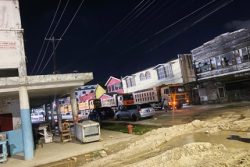BERLIN, (Reuters) – The East German lieutenant colonel who gave the fateful order to throw open the Berlin Wall 25 years ago said he wept in silence a few moments later as hordes of euphoric East Germans swept past him into West Berlin to get their first taste of freedom.
Harald Jaeger said in an interview with Reuters that he spent hours before his history-changing decision trying in vain to get guidance from superiors on what to do about the 20,000 protesters at his border crossing clamouring to get out.
When he had had enough of being laughed at, ridiculed and told by commanders to sort it out for himself, Jaeger ordered the 46 armed guards under his command to throw open the barrier.
He then stepped back and cried – tears of relief that the standoff had ended without violence, tears of frustration that his superiors had left him in the lurch and tears of despair from a man who had so long believed in the Communist ideal.
He had joined the border guard unit in 1961. Over 28 years, he saw the barrier grow from an infancy of coiled barbed wire, to a brick wall and then to maturity as a towering 160 Km (100 mile) double white concrete screen that encircled West Berlin, cutting across streets, between families, through graveyards.
“My world was collapsing and I felt like I was left alone by my party and my military commanders,” said Jaeger, now 71, remembering the night. “I was on the one hand hugely disappointed but also relieved that it ended peacefully. There could have been a different outcome.”
Historians point to Jaeger’s courage at the Bornholmer Street crossing as a decisive moment – at 11:30 p.m. on Nov. 9, 1989 – in the demise of the Berlin Wall and the end of the Cold War. Within hours East Germans were dancing on the Berlin Wall at the Brandenburg Gate and other border crossings soon opened.
Such scenes had been inconceivable for all but the naive. U.S. President Ronald Reagan had only recently held a speech at the border urging the Soviet leader, whose troops still held sway in the East: “Mr. Gorbachev, tear down this wall.” His words drew some smiles. The Wall, of course, was there to stay.
“Once I was able to come to terms with what happened I was happy for all the East German citizens too because they got what they wanted,” said Jaeger, who himself could have faced treason charges for his actions and was briefly subject of a state prosecutor’s investigation.
Earlier that evening, Jaeger had been on a dinner break at 7 p.m. and saw the now-famous televised press conference by Guenter Schabowski.
The senior Communist Party official, fumbling with a document before him, flustered and confused, announced almost by accident that East Germans would with immediate effect be allowed to travel freely to the West – something denied to generations after the Wall’s construction.
“When I saw him on TV say that I thought ‘what a load of total crap’,” said Jaeger. “He should have known that East Germans would head straight for the exits when they heard that. But they didn’t inform us at all. We were kept in the dark. Had I not seen that by chance, I’d have looked even more clueless.”








